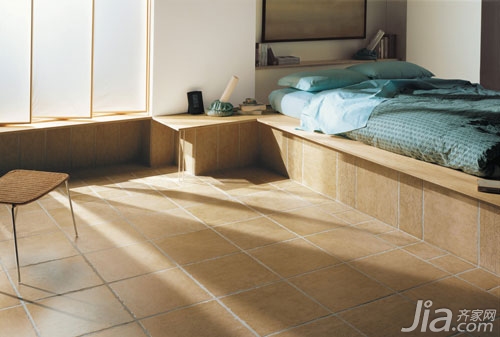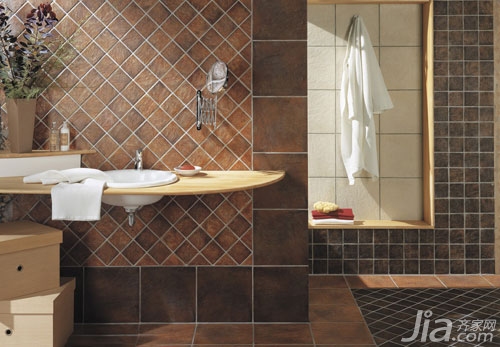Different characteristics of the floor tiles have their own best use, knowledge of the floor tile material is enough to be able to do a good job in decorating the room, make the best use of. Tile materials, according to its production process and features can be divided into glazed tiles, whole body tiles, polished tiles, vitrified tiles and mosaics.

1. Tile tiles made of floor tiles:
Vitrified tiles are made of quartz sand and mud in a certain proportion, then polished, but do not need to be polished, the surface is smooth and translucent like a glass mirror, and it is the hardest of all tiles. Porcelain tiles are superior to ordinary glazed tiles, polished tiles and general marble in terms of water absorption, edge straightness, bending strength, and acid and alkali resistance. However, the vitrified tile is not perfect, and its defect is that after being polished, the hair pores are exposed, and dust, oil, and the like are easily infiltrated. The classification is mainly floor tiles. A kind of polished tile. The scope of application of vitrified tiles for the living room, bedroom, walkways and so on.
Features: This is a high-temperature fired porcelain tile, which is the hardest of all floor tiles. Sometimes the tiles are still scratched when the tiles are scratched.
2. Floor tile brick:
The surface of the bricks is not glazing, and the material and color of the front and back surfaces are the same, hence the name. Whole bricks are more wear-resistant, but their color is less than glazed tiles. The classification is divided into non-slip tiles, polished tiles and osmotic bricks. The scope of application is widely used in halls, aisles, and outdoor walkways, and is generally less used on walls.
Features: This is a non-glazed porcelain tile with good slip resistance and abrasion resistance. Generally referred to as non-slip tiles are mostly bricks. Due to the moderate price of this brick, it is popular with consumers.

3. Polished tiles: Polished tiles are bricks that have been polished after being polished. Relative to the flat surface roughness of the whole brick, the polished tile must be more polished. This brick is very hard and very wear-resistant. Based on the application of the infiltration technology, the polished tiles can make various kinds of imitated stone and wood effect. The classification can be divided into percolation type polished tiles, micropowder type polished tiles, multi-tube cloth polished tiles and microcrystalline stones. Applicable range In addition to the bathroom, kitchen, most of the rest of the indoor space can be used.
Features: After polishing, the bricks become polished tiles, which are very hard and very wear-resistant.
4. Mosaic of floor tiles:
Mosaic is a kind of special existence brick, which generally consists of dozens of small blocks of bricks to form a relative big brick. Acid resistance, alkali resistance, wear resistance, no water seepage, strong pressure resistance, not easily broken. Classification It is mainly divided into ceramic mosaic, marble mosaic, glass mosaic. Scope of application It is widely used in indoor small area, wall and outdoor wall surface and ground with small size and colorfulness.
Characteristics of many specifications, thin and small, hard texture, acid, alkali, wear-resistant, watertight, resistant to pressure, not broken, colorful, widely used.

5. Glazed tiles for floor tiles:
Glazed tiles are tiles that have been glazed on the surface of the brick. In general, glazed tiles are richer in color and pattern than polished tiles, and also play an antifouling role. However, because the glazed tile surface is a glaze, the wear resistance is not as good as that of a polished tile. Classification is divided into ceramic glazed tiles and porcelain glazed tiles according to raw materials. According to different luster, it is divided into two kinds of matt and light.
Features: Application The kitchen should use bright glazed tiles, not matt glazed tiles, due to oil into the brick surface, it is difficult to clean. Glazed tiles are also suitable for bathroom balconies.
Editor's note: The material of the floor tiles can be applied to different areas according to different characteristics. The relevant knowledge of the floor tile materials is introduced here. If you want to know more information, you can pay attention to this website information, or go to this website to find more favorite products!
Tile Tile Floor Tile Marble Glass Space Decorative Floor Tile Glass Tile Craft Glass Kitchen Sliding Door Bathroom Tile Small Bedroom
Diamond Sharpening Stones is a Abrasive Honing Stones have man made diamonds bonded to a hard, rustles surface which provides an abrasive surface that is harder than any other material - Diamond Stones are very sharp and capable of lasting almost indefinitely. Use Diamond Stones to sharpen or lap almost anything, from tool steel to carbides to glass and ceramics (including ceramic stones). Whenever practical, wetting the stones with water or light oil will virtually eliminate clogging while you sharpen,but they can be used dry as well.
One of the most common arguments for using diamond sharpening plates is that they are flat and do not become hollowed out during their working lives. The first point is only partly true, as the flatness of the plates depends a great deal on the quality of, and the method used to manufacture the plate. But it is true that they do not become hollow in use, like other kinds of sharpening stones do.
Special Diamond Tool,Diamond Sharpening Stone,Rotary Diamond Bit,Polishing Honings Stone,Abrasive Honing Stones
Hans Superabrasive Material Co., Ltd. , http://www.hansuperabrasive.com